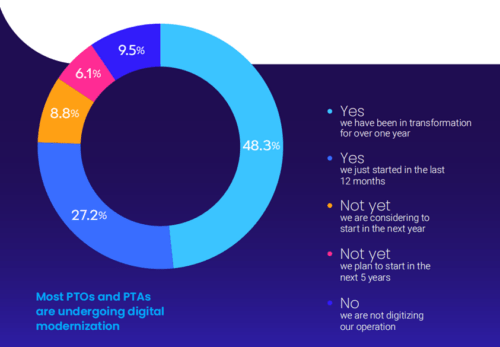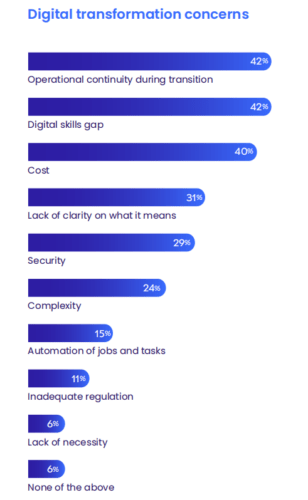
Software specialist Optibus has published a report with survey insights into the scope, maturity, and impact of digitalisation within the public transport industry. The report includes responses from transport practitioners in 34 countries into the industry’s digitalisation concerns, successes, and future.
The preface to the report says that the advent of digital technology has ushered in a new era for the public transport industry, characterised by rapid innovation in automation and artificial intelligence and shifting market dynamics surrounding new regulatory standards, labour, safety, sustainability and business models. It cautions that the transformation is not a trend, but a fundamental shift, and one that it says is necessary to address the complex challenges of modern mobility.
The responses show that the acceptance of and shift towards digital work tools is relatively uniform worldwide, suggesting that despite geographical and cultural differences, there is a global consensus regarding the future of the public transport industry and the importance of investing in innovation to address today’s and tomorrow’s challenges.
Key takeaways include that out of the 75.5% of respondents who said their organisation is in the process of digital transformation, one-third only started the transition in the last year; the biggest concerns regarding digitalisation are potential digital skills gaps in the workforce and risks to operational continuity during the transition; that an overwhelming percentage (80%) of respondents who described their digital transformation as ‘successful’ had invested in upskilling their teams, and; echoing the results of its previous report in 2023, driver shortages remain the top challenge going into 2024, followed by vehicle electrification.

The report concludes by suggesting five goals for effective and clear digital transformation:
1. Define clear digital transformation goals, as effective digital transformation requires setting up specific, strategic goals and regularly evaluating progress, with clear, measurable objectives — such as improving efficiency, customer satisfaction, or sustainability — allowing organisations to focus their resource investment, supported by continuous monitoring and adaptation.
2. Digital transformation is only as impactful as the team involved. Organisations must cultivate an environment of continuous learning, upskilling, and innovation, enabling teams to adapt to and leverage new technologies, including formal training programmes, experimentation, feedback, and talent development.
3. Prioritise a unified platform with integrated systems and advanced analytics which can unlock operational efficiencies, enhance service planning, and provide insights into passenger behaviours and preferences to give a holistic view of operations, and provide data-driven decisions, and improved cross-functional collaboration.
4. Investments should be channelled towards solutions that directly enhance the passenger experience, such as real-time information systems to app-based services and digital ticketing, which can enhance the customer’s journey at every touchpoint and drive satisfaction, loyalty, and ridership.
5. Partnerships with technology providers, academic institutions, and industry specialists can inform and improve the digital solutions coming to market, spanning electric vehicle management to systems integrations, whilst collaborative efforts can also facilitate knowledge sharing, benchmarking, and the development of best practices.

